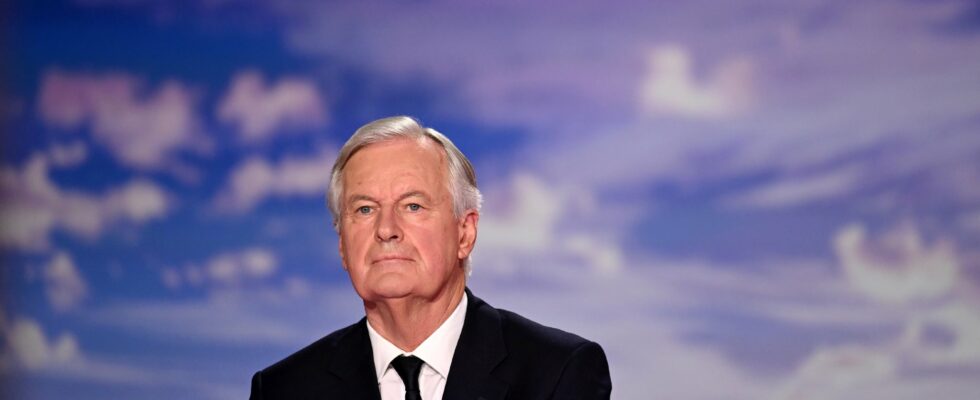Concerns and reactions are beginning to flow, after a speech by the new Prime Minister Michel Barnier on France 2, Sunday September 22 in the evening, which had the effect of clarifying his positions on a number of delicate subjects such as the recovery of public finances, immigration or even societal and social rights. The day after these statements, the new ministers, mostly from Macron’s party and the right, are returning to Matignon this morning, before taking possession of their respective ministries.
Key information to remember
⇒ A first council of ministers this Monday at Matignon
⇒ The major laws of social progress “will be preserved”, assures Michel Barnier
⇒ “The wealthiest people” will have to participate in the recovery of public finances
Sophie Binet wants the pension reform to be repealed
While Michel Barnier pledged Sunday evening on France 2 to “take the time to improve” the highly contested pension reform, the general secretary of the CGT reiterated this Monday morning that it is the repeal that she wants: “We are demanding the repeal of retirement at 64 and the increase in salaries that Michel Barnier has not spoken about at all, even though it is the number one concern of the French,” declared Sophie Binet on franceinfo. “What I note is the result of the balance of power. Emmanuel Macron, for a year and a half, has been trying to move on. However, the door is not closing,” she stressed, calling for “a strike and a demonstration on October 1.”
The return of the Barnier government
It is this Monday, September 23 that the new government of Michel Barnier, whose ministers’ names were announced on Saturday, takes possession of its quarters. The 39 new ministers and secretaries of state, overwhelmingly from the right and Macron’s party, are having their first “government breakfast” together this morning at Matignon. Before going to their respective ministries for the traditional handover ceremonies between 10 a.m. and 1 p.m., then continuing with their first council of ministers at 3 p.m., in the presence of Emmanuel Macron.
Treat immigration “with much greater rigor”
During his speech on the France 2 set, the new right-wing Prime Minister stated that the government should in the future “deal with this issue of immigration with much more rigor”. “There will be ruptures, much more firmness and at the same time humanity”, he added. “We will do practical things, like all our neighbors, to control and limit immigration that often becomes unbearable and which also leads to not welcoming those we welcome into our country”, continued the Prime Minister. On a possible abolition of state medical aid, he notably refused “any taboo or totem”.
Mental health, a “major national cause” in 2025
Prime Minister Michel Barnier announced Sunday evening that he wanted to make “mental health” the “great national cause” of the year 2025, during an interview on France 2. Psychiatry is undergoing a serious and persistent crisis in France: a third of hospital practitioner positions are vacant and the volume of beds is decreasing, while the number of patients has doubled in the last twenty years. A highly anticipated National Refoundation Council (CNR) dedicated to mental health was scheduled for this summer but was cancelled after the dissolution of the National Assembly, decided by Emmanuel Macron.
IVG, LGBT… General concern for societal rights
“Against marriage for all, the opening of medically assisted procreation to lesbian couples, the ban on conversion therapy, the constitutionalization of abortion or the rights of trans people… And sometimes against all of these at once”: the association SOS Homophobie expressed its “deep indignation” on discovering the names of certain ministers. Olivier Faure, the head of the PS, castigated a “reactionary government”. Even in the government coalition, there are questions: Gabriel Attal, who was the first French head of government to have publicly mentioned his homosexuality, informed his troops that he would ask Michel Barnier “to clearly state in his general policy statement that there will be no going back on medically assisted procreation, the right to abortion, LGBT rights”.
Several members of the government are close to the “Manif pour Tous” movement. Bruno Retailleau, the new Minister of the Interior, who led the battle against the inclusion of abortion in the Constitution, Laurence Garnier, LR senator opposed to same-sex marriage and the constitutionalization of abortion, Patrick Hetzel, LR deputy who notably spoke out against marriage for all… On the networks, activists have also tracked the votes and statements deemed worrying on societal issues by Annie Genevard (Agriculture), Astrid Panosyan-Bouvet (Labor), or Othman Nasrou, responsible for the fight against discrimination. In response, Michel Barnier assured Sunday evening that the “major laws” of “social or societal progress” such as those on voluntary termination of pregnancy or medically assisted procreation (AMP or PMA) will be “fully preserved”.
Barnier’s appeal to wealthy taxpayers to straighten out public finances
Invited onto the set of the 8pm news on France 2 this Sunday evening, September 22, the new Prime Minister Michel Barnier clarified his positions on several delicate points. On the question of public finances, he notably indicated that he intended to ask “the richest to take part in the solidarity effort”. “I am not going to further increase taxes on all French people who already pay the most taxes of all European partners”, he assured, “neither on the poorest people, nor on people who work, nor on the middle classes”. “Targeted levies on wealthy people or certain large companies” could thus be made.
Michel Barnier also expressed concern about a possible loss of confidence in France by the markets: “a large part of our debt is issued on international, external markets, we must maintain France’s credibility,” he insisted, while the new government is due to present a new budget on October 9. France is the subject of a Brussels procedure for excessive deficit, which could reach 5.6% of GDP this year, much higher than the 3% authorized by the EU to its members.
